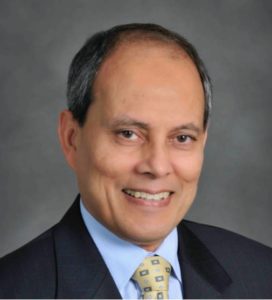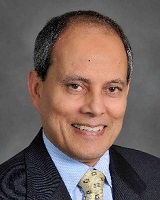Events
Title: Josephson Arbitrary Waveform Synthesizer as a Quantum Standard of Voltage and Current Harmonics
Speaker: Dr. Dimitrios Georgakopoulos, Senior Research Scientist, National Measurement Institute, Sydney, Australia
Date/Time:Â Thursday, July 09, 2020, 6:30 pm – 7:30 p.m. EDT
Abstract: Josephson arbitrary waveform synthesizers (JAWS) are becoming a viable technology for national metrology institutes and industry to establish quantum standards of direct and alternating voltage. At the National Measurement Institute of Australia (NMIA) we have extended the application of the JAWS to provide a standard of both the magnitude and the phase of harmonics in a distorted waveform. Harmonic analysis is critical in a number of industrial applications such as electric power systems, power electronics, characterization of systems and materials and acoustics and vibration. At present, in the calibrations of power analyzers, the traceability of the magnitude of the harmonics is based on ac-dc transfer measurements. However, there is a gap in the traceability of the phase of the harmonics relative to the fundamental. The NMIA calibration system uses a JAWS chip from the National Institute of Standards and Technology (NIST), USA, a precision inductive voltage divider and a set of current shunts designed and manufactured by NMIA. For distorted waveforms with harmonic magnitudes from 5% to 40% of the fundamental, the calibration system can measure odd harmonics up to the 39th with magnitude uncertainties better than 0.001 % of the fundamental for voltage (from 0.01 V to 240 V) and current (from 0.005 A to 20 A) waveforms. The best phase uncertainties range from 0.001° to 0.010° (k = 2.0), depending on the harmonic number and harmonic magnitude. We anticipate that the ability of the JAWS to generate distorted waveforms with the lowest possible uncertainty in the magnitude, and phase spectra will make it a unique tool for low-frequency spectrum analysis.
Speaker’s Bio: Dimitrios Georgakopoulos (IEEE AM’11–M’12–SM’12) was born in Athens, Greece, in 1972. He received his B.Eng. degree in electrical engineering from the Technological Educational Institution of Piraeus, Egaleo, Greece, in 1996; his M.Sc. degree in electronic instrumentation systems from the University of Manchester, Manchester, UK, in 1999; and Ph.D. in electrical engineering and electronics from the University of Manchester Institute of Science and Technology, Manchester, UK, in 2002. From 2002 to 2007, he worked as a research scientist at the National Physical Laboratory, UK. In 2007, he joined the National Measurement Institute, Australia, as a research scientist, where he has been working on the development of quantum voltage standards and low frequency electromagnetic compatibility (EMC) standards. Dr Georgakopoulos is an Associate Editor of the IEEE Transactions on Instrumentation and Measurement, member of the IEEE IMS Measurements in Power Systems Committee (TC‑39), member of the NATA Accreditation Advisory Committee for Calibrations, and member of the American Association for the Advancement of Science (AAAS), USA.
Admission: Free, but registration is required at https://events.vtools.ieee.

Registration is required. A link to the event will be sent to those registered closer to the event date.
Register here: https://www.eventbrite.ca/e/resource-management-for-massive-connectivity-in-future-wireless-networks-tickets-111059596242
About this Event
Future wireless networks (beyond 5G/sixth-generation (6G) networks)
are envisioned to support 3D communication by integrating terrestrial
and aerial networks. The objective is to provide connectivity to a large
number of devices (known as massive connectivity), to support
substantial traffic demands, and expand coverage. However, effective
resource management in future wireless networks is a challenge because
of massive resource-constrained devices, diverse quality-of-service
(QoS) requirements, and a high density of heterogeneous devices. In this
seminar, I will present my recent research progress which is focused on
communication networking aspects of the Internet of Things (IoT), with
emphasis on algorithm design, network architecture development, and
system-level performance analysis. I will provide a brief discussion on
my three most significant contributions which focuses on the design of
novel algorithms and communication protocols for IoT networks, that have
both (i) enhanced network performance, in terms of spectrum efficiency,
coverage, and energy efficiency, and (ii) satisfied a wide range of IoT
devices’ requirements and constraints. I will then share long-term goal
of my research program which is to develop efficient and low complexity
resource management schemes to tackle the challenges of seamless
connectivity of heterogeneous devices anytime and anywhere. Finally, I
will present my short-term objectives in the next five years which are
to develop resource management schemes for massive connectivity in
future terrestrial networks, aerial networks, and self-sustainable
networks (SSNs) while considering different objectives and constraints,
including network scalability, reliability, latency, efficiency
(spectral usage and energy consumption), and complexity.
BIOGRAPHY
Waleed
Ejaz (S’12-M’14-SM’16) is an Assistant Professor in the Department of
Applied Science & Engineering at Thompson Rivers University,
Kamloops, BC, Canada. He is also the founding director of Next
Generation Wireless Networks (NEWNET) research laboratory. Previously,
he held academic and research positions at Ryerson University, Carleton
University, and Queen’s University in Canada. He received the B.Sc. and
M.Sc. degrees in Computer Engineering from the University of Engineering
and Technology, Taxila, Pakistan and the National University of
Sciences and Technology, Islamabad, Pakistan, and the Ph.D. degree in
Information and Communication Engineering from Sejong University,
Republic of Korea, in 2014. He has co-authored over 90 papers in
prestigious journals and conferences, and 3 books. His current research
interests include Internet of Things (IoT), energy harvesting, 5G and
beyond networks, and mobile edge computing. He is an Associate Editor of
the IEEE Communications Magazine, IEEE Canadian Journal of Electrical
and Computer Engineering, and the IEEE ACCESS. Dr. Ejaz completed
certificate courses on “Teaching and Learning in Higher Education†from
the Chang School at Ryerson University. He is a registered Professional
Engineer (P.Eng.) in the province of British Columbia, Canada. Dr. Ejaz
is a senior member of IEEE, member of ACM, and ACM distinguished
speaker.
#IEEEWIEOttawa

Webinar: Role of the Smart Grid in Facilitating the Integration of Renewables
Speaker: Prof. Dr. Saifur Rahman, Director, Virginia Tech Advanced Research Institute, USA, IEEE Power & Energy Society (PES) President 2018-2019, IEEE PES Distinguished Lecturer
Date/Time: Tuesday, July 28, 2020, 6:30 pm – 7:30 p.m. EDT
Admission: Free, but registration is required: https://events.vtools.ieee.org/m/234594
For more details, please visit: https://www.ewh.ieee.org/soc/pes/ottawa
Abstract – With the focus on environmental sustainability and energy security, power system planners are looking at renewable energy as supplements and alternatives. But such generation sources have their own challenges – primarily intermittency. It is expected that the smart grid – due to its inherent communication, sensing and control capabilities – will have the ability to manage the load, storage and generation assets (including renewables) in the power grid to enable a large-scale integration of distributed generation. In a smart grid, information about the state of the grid and its components can be exchanged quickly over long distances and complex networks. It will therefore be possible to have the integration of sustainable energy sources, such as wind, solar, off-shore electricity, etc. for smoother system operation. But in order for this to be possible, the electric utility will have to evolve, and change their ways of operation to become an intelligent provider of these services. This lecture introduces the operational characteristics of renewable energy sources, and various aspects of the smart grid – technology, standards and regulations. It also addresses the interplay among distributed generation, storage and conventional generation to provide an efficient operational strategy in the context of the smart grid.

Registration/Ticket URL
Event Website
https://wie.ieeeottawa.ca/event/wie-can-with-ancwt-advancing-new-canadian-women-in-technology/
Abstract:
In this ever-changing world, it’s important to have the support of someone who could help and guide us to advance in our career. Women are great achievers, but due to the systemic bias, many are unable to climb up to leadership positions in their career. Women empowerment is very much needed especially in these tough times and promoting women by providing platforms where they could build themselves is need of the hour. Here in IEEE WIE, we understand its importance and try to provide such platforms especially to the women in our society who lag behind in their learning path because of many reasons and couldn’t come up. IEEE wants every woman to achieve what they desire to be. We promote not only women but also men who understand and go by our notion.
ANCWT (Advancing New Canadian Women in Technology) aim is to help women with technical skills in engineering accomplish their goals by providing an employment bridging program. ANCWT was established in 2016 and has collaborated with multiple employers in the engineering field. Therefore, the IEEE-WIE, Ottawa, and ANCWT have come forward and took an oath, that we will strive hard to make women gain the required knowledge and confidence to overcome this barrier and find themselves in the background of every picture. Join us on 10th August 2020, in a seminar in which Dr. Sawsan Abdul Majid, President of ANCWT accompanied by two alumni of ANCWT, Oyaje Omakwu, and Dalia Elimam will and take us through their journey with ANCWT in Canada.
Speaker Bio:
Dr. Abdul-Majid is a member of the academic community at the faculty of engineering at the University of Ottawa since 2008 as (Researcher, group manager, Part-time professor & graduate student coordinator). She holds a Ph.D. in Optical Communication Systems from Varna University, Bulgaria, and brings more than 25 years of academic (Teaching & Research) experience, as well as eight years of industrial experience and she has more than 45 publications.
Sawsan is a creator and a president of Advancing New Canadian Women in Technology (ANCWT), a Uottawa based employment bridging program. https://ancwt.ca
Her goal is to help newcomer women (immigrants & refugees) who have gained their educations in engineering, IT, and computer science from abroad find their dream jobs in Canada, and settle within the Ottawa community.
Oyaje Omakwu holds a bachelors’ degree in Mechanical Engineering from Nigeria and a masters’ degree in Engineering Management from the University of Ottawa. She has 10 years of experience in project management and business analysis.
She joined ANCWT cohort in 2018, through which she got the opportunity to work as a Project Analyst with the Dept. of Fisheries and Oceans, Canada. It is her desire to help new immigrant women learn about the ANCWT program and its benefits and she is part of the team overseeing ANCWT online activities.
Dalia Elimam, a Chemical Engineer from U.A.E with 16 years of experience in chemical analysis for drinking water pesticides and toxins in food for UAE government. She was introduced to ANCWT in 2019 through the newcomers’ program which guided her to find an entry-level position at Dept. of Fisheries and Oceans- Canada. She is now a Jr. Business Analyst at DFO and work with the client portfolio management team.

ADMISSION: Free, but the registration in advance is required.
REGISTRATION:Â https://events.vtools.ieee.org/m/236964.
Abstract – A smart city relies on widely distributed smart devices to monitor the urban environment in real-time, collects information for intelligent decision making, and facilitates various services to improve the quality of urban living. The distributed network of intelligent sensor nodes, as well as data centers/clouds where sensor data are stored and shared, constitutes a smart city infrastructure. Smart cities address urban challenges such as pollution, energy efficiency, security, parking, traffic, transportation, and others by utilizing advanced technologies in data gathering and communications interconnectivity via the Internet. It provides real time and remote monitoring for different aspects of data management in areas such as transportation, communication, video surveillance, and sensors distributed throughout the city. Simultaneously, the Smart City building blocks like education, telemedicine, health care, IT applications, pollution management, etc. can be deployed in the IEEE Smart Village initiative to have a greater impact on the rural population throughout the world. through reliable electricity and internet connectivity.
Speaker Bio – Prof. Dr. Saifur Rahman is the founding director of the Advanced Research Institute (www.ari.vt.edu) at Virginia Tech, USA, where he is the Joseph R. Loring Professor of Electrical and Computer Engineering. He also directs the Center for Energy and the Global Environment (www.ceage.vt.edu). He is a Life Fellow of the IEEE and an IEEE Millennium Medal winner. He was the founding Editor-in-Chief of the IEEE Electrification Magazine and the IEEE Transactions on Sustainable Energy. In 2006, he served on the IEEE Board of Directors as the Vice President for Publications. He is a Distinguished Lecturer for the IEEE Power & Energy Society (PES) and has lectured on renewable energy, energy efficiency, smart grid, electric power system operation and planning, etc. in over 30 countries. He was IEEE Power and Energy Society President 2018-2019 and is now a candidate for IEEE President-Elect 2021.
He chaired the US National Science Foundation Advisory Committee for International Science and Engineering, 2010-2013. He conducted several energy efficiency projects for Duke Energy, Tokyo Electric Power Company, US National Science Foundation, US Department of Defense, State of Virginia and US Department of Energy.
For any additional information, please contact: ajit.pardasani@ieee.org or branislav@ieee.org

